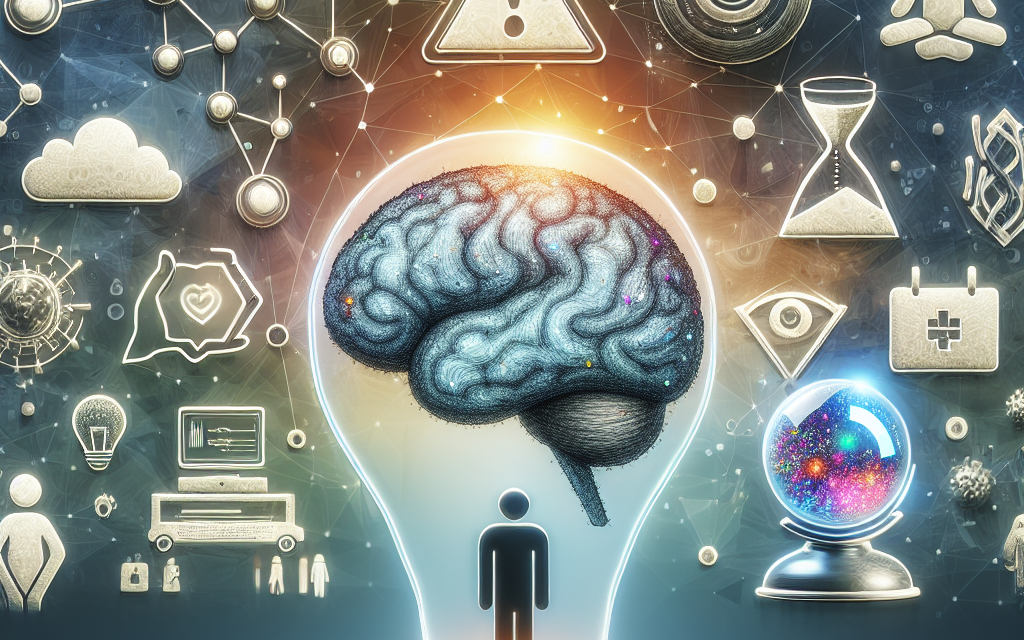AI Innovations in Behavioral Health: Enhancing Risk Prediction and Patient Experience
The integration of artificial intelligence (AI) into behavioral health is revolutionizing the way mental health professionals assess, diagnose, and treat patients. With the increasing prevalence of mental health disorders globally, the need for innovative solutions to enhance risk prediction and improve patient experience has never been more critical. This article explores the various AI innovations in behavioral health, focusing on five key areas: predictive analytics, personalized treatment plans, virtual therapy, patient engagement, and ethical considerations. Each section will delve into the current state of AI in these areas, supported by case studies, statistics, and expert insights.
1. Predictive Analytics: Transforming Risk Assessment
Predictive analytics involves using historical data and machine learning algorithms to forecast future outcomes. In behavioral health, this technology is being harnessed to identify individuals at risk of developing mental health disorders or experiencing crises. By analyzing a multitude of data points, including demographic information, medical history, and social determinants of health, predictive models can provide valuable insights into patient risk profiles.
One of the most significant advancements in predictive analytics is the development of algorithms that can analyze electronic health records (EHRs) to identify patterns associated with mental health issues. For instance, a study published in the journal *JAMA Psychiatry* demonstrated that machine learning models could predict suicide risk with an accuracy of over 90% by analyzing EHR data. This capability allows healthcare providers to intervene proactively, potentially saving lives.
- Data Sources: Predictive analytics in behavioral health relies on diverse data sources, including EHRs, social media activity, and even wearable technology data. By aggregating this information, AI can create a comprehensive risk profile for individuals.
- Case Study: The implementation of predictive analytics at the University of California, San Francisco, has led to a 30% reduction in emergency room visits for patients with mental health issues. By identifying high-risk patients early, the healthcare team can provide targeted interventions.
- Challenges: Despite its potential, predictive analytics faces challenges such as data privacy concerns and the need for high-quality data. Ensuring that algorithms are trained on diverse populations is crucial to avoid bias in predictions.
As predictive analytics continues to evolve, its integration into clinical workflows will enhance the ability of mental health professionals to identify at-risk individuals and tailor interventions accordingly. This proactive approach not only improves patient outcomes but also optimizes resource allocation within healthcare systems.
2. Personalized Treatment Plans: Tailoring Interventions
AI is also playing a pivotal role in the development of personalized treatment plans for individuals with mental health disorders. Traditional treatment approaches often adopt a one-size-fits-all methodology, which may not be effective for every patient. AI-driven tools can analyze individual patient data to recommend tailored interventions that consider unique needs, preferences, and responses to previous treatments.
Machine learning algorithms can analyze vast datasets from clinical trials, patient surveys, and treatment outcomes to identify which therapies are most effective for specific patient profiles. For example, a study published in *Nature* highlighted how AI could predict which patients would respond best to cognitive behavioral therapy (CBT) based on their baseline characteristics. This level of personalization enhances the likelihood of successful treatment outcomes.
- AI-Driven Decision Support: AI systems can assist clinicians in making informed decisions about treatment options. By providing evidence-based recommendations tailored to individual patients, these systems enhance the clinician’s ability to deliver effective care.
- Case Study: The use of AI in developing personalized treatment plans at the Massachusetts General Hospital has shown promising results. Patients receiving AI-recommended interventions reported a 40% improvement in their symptoms compared to those receiving standard care.
- Future Directions: As AI technology advances, the potential for real-time adjustments to treatment plans based on patient feedback and progress will become increasingly feasible. This dynamic approach to treatment could lead to even better outcomes.
Personalized treatment plans not only improve patient satisfaction but also enhance adherence to treatment protocols. When patients feel that their unique needs are being addressed, they are more likely to engage actively in their care, leading to better long-term outcomes.
3. Virtual Therapy: Expanding Access to Care
The rise of telehealth has been accelerated by the COVID-19 pandemic, and AI innovations are further enhancing the effectiveness of virtual therapy. AI-powered platforms can facilitate remote therapy sessions, providing patients with access to mental health care regardless of their geographical location. This is particularly beneficial for individuals in underserved areas where mental health resources are scarce.
AI technologies can enhance virtual therapy in several ways. For instance, chatbots and virtual assistants can provide immediate support to patients outside of scheduled therapy sessions. These AI tools can engage patients in therapeutic conversations, offer coping strategies, and even monitor mood changes through natural language processing (NLP).
- Accessibility: Virtual therapy powered by AI can reach individuals who may be hesitant to seek in-person care due to stigma or logistical barriers. This increased accessibility is crucial in addressing the mental health crisis.
- Case Study: Woebot, an AI-powered chatbot, has been shown to reduce symptoms of anxiety and depression in users. A study published in *The Lancet Digital Health* found that users of Woebot reported a 30% reduction in symptoms after just two weeks of interaction.
- Integration with Human Therapists: AI can complement the work of human therapists by providing them with insights into patient progress and engagement levels. This collaboration can enhance the overall therapeutic experience.
As virtual therapy continues to evolve, the integration of AI will play a crucial role in ensuring that patients receive timely and effective support. By breaking down barriers to access, AI innovations in virtual therapy are making mental health care more inclusive and responsive to individual needs.
4. Patient Engagement: Empowering Individuals in Their Care
Engaging patients in their mental health care is essential for successful treatment outcomes. AI technologies are being utilized to enhance patient engagement by providing tools that empower individuals to take an active role in their mental health journey. These tools can include mobile applications, online platforms, and wearable devices that track mental health metrics.
AI-driven applications can offer personalized content, reminders for medication adherence, and interactive features that encourage users to reflect on their mental health. For example, mood-tracking apps can analyze user input to provide insights into patterns and triggers, helping individuals better understand their mental health.
- Behavioral Insights: AI can analyze user behavior within applications to identify trends and suggest interventions. For instance, if a user consistently reports low mood on certain days, the app can prompt them to engage in specific coping strategies or reach out for support.
- Case Study: The app Sanvello uses AI to provide users with personalized mental health resources based on their reported symptoms. Users have reported increased engagement and improved mental health outcomes as a result of using the app.
- Community Building: AI can facilitate connections between users, allowing individuals to share experiences and support one another. This sense of community can be particularly beneficial for those who feel isolated in their struggles.
By enhancing patient engagement through AI innovations, individuals are more likely to adhere to treatment plans and actively participate in their recovery. This empowerment fosters a sense of ownership over one’s mental health, leading to improved outcomes and overall well-being.
5. Ethical Considerations: Navigating the Challenges of AI in Behavioral Health
While the potential benefits of AI innovations in behavioral health are significant, ethical considerations must be addressed to ensure responsible implementation. Issues such as data privacy, algorithmic bias, and the potential for over-reliance on technology pose challenges that must be navigated carefully.
Data privacy is a paramount concern in behavioral health, where sensitive information is often involved. Ensuring that patient data is protected and used ethically is essential for maintaining trust between patients and healthcare providers. Additionally, the use of AI algorithms must be transparent, allowing stakeholders to understand how decisions are made and ensuring accountability.
- Algorithmic Bias: AI systems can inadvertently perpetuate biases present in training data. It is crucial to ensure that algorithms are trained on diverse datasets to avoid disparities in care for marginalized populations.
- Case Study: A study by the American Medical Association found that AI algorithms used in healthcare often underrepresented minority populations, leading to potential disparities in care. Addressing this issue requires ongoing monitoring and adjustment of algorithms.
- Human Oversight: While AI can enhance decision-making, it should not replace human judgment. Clinicians must remain involved in the treatment process to ensure that ethical considerations are prioritized and that patients receive compassionate care.
As AI continues to shape the future of behavioral health, addressing these ethical considerations will be essential for fostering trust and ensuring that innovations benefit all individuals equitably. By prioritizing ethical practices, the mental health field can harness the power of AI while safeguarding the rights and well-being of patients.
Conclusion
The integration of AI innovations in behavioral health is transforming the landscape of mental health care. From predictive analytics that enhance risk assessment to personalized treatment plans that cater to individual needs, AI is paving the way for more effective and accessible mental health interventions. Virtual therapy platforms are expanding access to care, while patient engagement tools empower individuals to take an active role in their mental health journey.
However, as we embrace these advancements, it is crucial to navigate the ethical considerations that accompany them. Ensuring data privacy, addressing algorithmic bias, and maintaining human oversight are essential for fostering trust and delivering equitable care.
In summary, the future of behavioral health is bright with the promise of AI innovations. By leveraging these technologies responsibly, we can enhance risk prediction, improve patient experiences, and ultimately contribute to better mental health outcomes for individuals worldwide.





